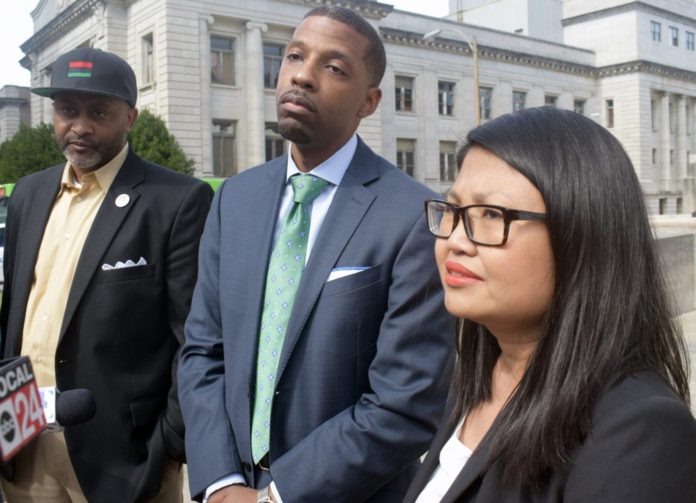Voter registration forms – 4,000 to 6,000 that have been set aside – are the issue.
According to the Memphis Branch NAACP, The Tennessee Black Voter Project and individuals who feel wronged, the Shelby County Election Commission is illegally holding up voter registrations without proper notification to individuals. The result, they argue, is that voters are being deprived of the opportunity to remedy their registrations, as required by law.
Plaintiffs filed an amended suit Tuesday against the Election Commission, with the case set for Chancery Court on Wednesday. However, after a brief session it was reset for Thursday, pending the resolution of schedule conflicts with presiding Chancellor JoeDae L. Jenkins and attorney John Ryder, who represents the Election Commission.
In a brief interview later, Election Commission Administrator Linda Phillips remained skeptical that the case had any validity.
“I just think this suit is solely for the purpose of drawing attention,” said Phillips. “I want everyone to vote. We have done the best possible job, I feel, in processing the registrations presented by these organizations. Thousands and thousands were dumped on us at the last minute, and I believe it was to make us rush through some of these registrations.”
Phillips came prepared with several voter registration forms she deemed indicative of the kinds errors she said were found on submitted applications.
“On one application, the first name is misspelled,” Phillips said. “That just seems highly unlikely to me. On another application, we compared the signature of one applicant with the signature we had on file. They don’t match. We want everyone to have the opportunity to vote, but I am afraid of voter fraud. I mean, that really scares me.”
Alexander Wharton, who represents the NAACP and The Tennessee Black Voter Project, said those who are in “voter purgatory” are not being given the opportunity to correct or complete forms, according to a provision of Tennessee law.
“People are not being notified that their voter enrollments have not been processed,” he said. “This is a clear violation of the law. Not only must they be notified that their enrollment is being held up, but they must be allowed time to remedy any deficiencies on their application.”
Wharton said the Tennessee Black Voter Project has offered to contact those individuals for the Election Commission, but said there has been no response to that offer.
“If this is not a matter of under-staffing, then there is no excuse for these people not to be contacted,” Wharton said. “These kinds of things keep happening to members of the minority community, and we want to protect the right of every eligible voter in Shelby County. Everyone should have the opportunity to have their voice heard at the polls.”
Prior to Wednesday’s brief court hearing, Wharton, attorney Bo Dul, who represents the Tennessee Black Voter Project, and the Rev. Earle J. Fisher with Up the Vote 901, talked about the matter at a media conference outside the courthouse.
Dul acknowledged news accounts reporting Election Commission assertions that the plaintiffs had been extended the opportunity to use Election Commission electronic devices that would have aided them in the process of registration.
“The first time we heard it was when we heard it in the news,” Dul said. “We probably would have accepted that offer. It would have facilitated the registration process. There is clearly some miscommunication. But at this point, we just want to work with the commission. We want to work together.
“We want to ensure that everyone who submitted a timely registration form is able to vote and to cure any deficiencies in their forms and exercise their fundamental right to vote either during Early Voting or on Election Day.”
Early Voting continues through Nov. 1. Election Day is Nov. 6.
“Nitpicking” is how the Election Commission’s actions regarding the set-aside registration forms feel, said Fisher, who made reference to Phillips’ appearance at a Shelby County Commission committee meeting earlier in the day.
“They talked about registrations being dumped on them at the last minute, but all of these registrations met the deadline; a deadline that was not established by people in the community, but was established by a governing body. If it was a last-minute or eleventh-hour type of issue, I think that burden would fall on them and not the people who were engaged in obtaining these registrations,” Fisher said.
“We heard of a claim of potential voter fraud, which is something that I would want the Election Commission to qualify and quantify. If there have been tens of thousands of registrations and there has been no number mentioned of how many ‘fraudulent’ registrations exist, then that’s a claim that seems to reek of something that we hear coming out of other governmental entities that are often misleading and misrepresentative of the facts.”
Memphis, said Fisher, “sadly” is no exception to instances of voter suppression that have surfaced elsewhere in the country.
Too often – and noticeably amid Early Voting – issues continue to arise regarding polices that are implemented or have not been implemented and should be implemented to give people more access to voting, he said.
(The New Tri-State Defender Associate Publisher/ Executive Editor Karanja A. Ajanaku contributed to this story.)



